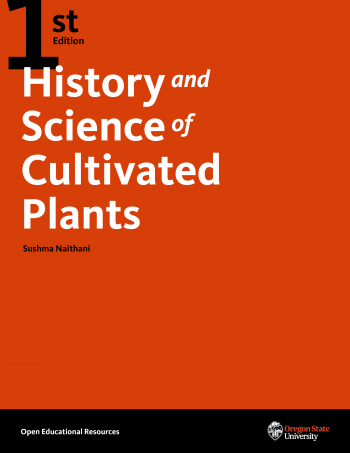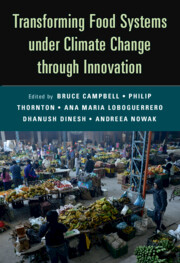|
|
Producing crops is the goal for many farms, however, this is easier said than done. "Agronomy is the science and practice of crop production to produce food, feed, fiber, and fuel. Agronomists need to understand plants, soils, insects, microorganisms, climate and how they interact with each other within agroecosystems" (Canadian Society of Agronomy, n.d.). Crop production is related to food security, nutrition, business, and sustainability. "Total production of primary crops increased by 53 percent between 2000 and 2019, to a record high of 9.4 billion tonnes in 2019" (FAO, 2021).
Photo by Meredith Petrick on Unsplash |
Sources:
Open books may be 100% open or there may be chapters that are open. It is important to critically analyze open books and think about who or why the information is being shared in this format, before deciding to use it. For example, who are the authors/publisher and what else have they published? When was it published - is there more up-to-date information available? Is it for a Canadian, American, or international context? You may need to click "read online" or scroll to the bottom of the information page to see more details such as the description or table of contents. Some open books also have extra features such as activities, exercises, or videos.
Open books may be 100% open or there may be chapters that are open.

"Using examples of various economically and socially important crops central to human civilization, the book describes the origin of crop plants, the evolution of agricultural practices, fundamental concepts of natural selection vs. domestication, experimental and methodical plant breeding, and plant biotechnology." - Website. Shared under a CC BY-NC 4.0.

"This book tells the story of why food system transformation is needed, how it can be achieved and how research can be a catalyst for change. Written by a global interdisciplinary team of researchers, it brings together perspectives from multiple areas including climate, environment, agriculture, and the social sciences to describe how different tools and approaches can be used to tackle food system transformation."

"Farming Inside Invisible Worlds argues that the farm is a key player in the creation and stabilisation of political, economic and ecological power-particularly in colonised landscapes like New Zealand, America and Australia." Shared under a CC-BY-NC-ND license

"This book is about the invisible or subtle nature of food and farming, and also about the nature of existence. Everything that we know (and do not know) about the physical world has a subtle counterpart which has been scarcely considered in modernist farming practice and research." - Taylor & Francis website. Shared under a CC BY-NC-ND license.

"This book presents evidence-based research on climate-neutral and resilient farming systems and further provides innovative and practical solutions for reducing greenhouse gas emissions and mitigating the impact of climate change." Shared under Creative Commons Attribution-Non Commercial-No Derivatives 4.0 license.

"Provides an up to date scientific overview of aquaponics; Broadens its understanding, current developments and trends; Clarifies the difference between one-, dual-, and multi-loop aquaponics systems; Discusses framework conditions, technology, perspectives for sustainable development, management and education; Written by an international authorship from five continents." - Publisher website

"Gathers a unique blend of contributions by internationally respected potato experts, providing both global and local perspectives and experience. Delivers a fresh and cutting-edge perspective, updating its previous version published by Springer in 1992" - Publisher website

"An excellent reference source for plant breeders, geneticists and seed companies as well as for undergraduate and postgraduate students specializing in agriculture, biotechnology, and molecular breeding." - Publisher website

"Gathers recent advances in wheat research in a single volume, with contributions by international experts. Presents comprehensive coverage of multiple aspects of wheat sciences, from laboratory to field. Provides practical guidance in genetic and genomic research that can be applied not only to wheat, but also to other species with complex genomes." - Publisher website
You can find open access journals in online collections such as DOAJ or OAPEN. Alternatively, you can check out a publisher's website to see if they support open access options. Open journals may be entirely open or only certain articles may be available as open access.
Searching a website such as DOAJ can help you find reputable journals as untrustworthy journals exist. There are open journals known as predatory journals that will "prey" on unsuspecting academics trying to publish. They may engage in a number of dubious, academically illegitimate, or even unethical practices (e.g. charging exorbitant author-side fees or utilising inadequate or false peer review processes).
The provincial and federal governments are making some of their data open to be used and shared by researchers, educators, policy makers, and people working within the agriculture sector. Check out the links below for a sample of Canadian and international data.
When searching for books (print or electronic) and DVDs using the Library search, it is best to use keywords to search rather than sentences. Think of a keyword that describes the overarching topic you want to look for. It may be also helpful to think of synonyms for this term and try searching for those as well. When searching for books, you want to be specific but not granular about the topic (think about how a book may be described overall). You'll find some example keywords and searches below, can you think of others?
[Note: We are working to improve access to our collections and revising our subject headings to be more respectful and inclusive. Please be aware that you may see certain words or descriptions in search results or library materials which reflect the author’s attitude or that of the period in which the item was created and may now be considered offensive.]
DISCLAIMER: UFV print books are not open access or open educational resources because they are not free from copyright restrictions (so fair dealing rules still apply), however, they are free to access for UFV students, faculty, staff, and alumni. Community borrowers are also permitted to borrow print resources - for more information please see the 'Access to UFV Library Books' section on this page.
This comprehensive textbook takes a scientific approach to explaining the principles of modern conventional and sustainable commercial vegetable production. The book describes the basic botany of vegetables, environmental requirements for successful growth and development, mineral nutrition, field establishment, harvesting methods, and post-harvest handling practices.--COVER.
"This practical book covers the major topics of interest to blueberry breeders and researchers including botany, physiology, nutrition, growth regulation, photosynthesis, environment, weeds, pests, diseases and post-harvest management. The main focus is on the most important cultivated species, the highbush blueberry, although information on other blueberries and related species is also provided."
"The term 'carbon farming' is used to describe a suite of crops and agricultural practices that sequester carbon in the soil. If widely implemented, these practices have the capacity to sequester hundreds of billions of tons of carbon from the atmosphere in the coming decades. Combined with a massive global reduction in fossil fuel emissions, it can bring us back from the brink of disaster and return our atmosphere to the 'magic number' of 350 parts per million of carbon dioxide. These practices can also feed people, build more fertile soils, and contribute to ecosystem health."
"As a collection of papers that includes material present at the 2013 International Congress for Plant Pathology, this text features research right at the leading edge of the field. The findings are crucial in their implications for fruit production; an important marker sector where in some areas up to 50 percent of the crop can be lost after harvest."
"The world is more interested in issues surrounding agricultural and food issues than ever before. Are pesticides safe? Should we choose locally grown food? Why do some people embrace new agricultural technologies while others steadfastly defend traditional farming methods?... This book confronts the most controversial issues in agriculture by first explaining the principles of each side of the debate, guiding readers through the scientific literature so that they can form their own educated opinions." --Page 4 of cover.
"Along with profiles of forest farmers from around the country, readers are also provided comprehensive information on historical perspectives of forest farming; mimicking the forest in a changing climate; cultivation of medicinal crops; cultivation of food crops; crating a forest nursery; harvesting and utilizing wood products; the role of animals in the forest farm; and how to design your forest farm and manage it once it's established."
UFV students, faculty, and alumni can borrow print UFV Library books. UFV Library also allows retired faculty and individuals from the B.C. community to sign out books after they have signed up for a community borrower card (there is a $5 one time fee). Please present your UFV ID card at the circulation desk. Limits will apply to alumni and community borrowers. For more information about borrowing materials, please see the links below:
Current UFV students, faculty, and staff have access to thousands of journals that the library subscribes to - for free! Some of the journals within our databases are open access, while others are not. UFV alumni can access library databases only when on-campus.
© , University of the Fraser Valley, 33844 King Road, Abbotsford, B.C., Canada V2S 7M8

